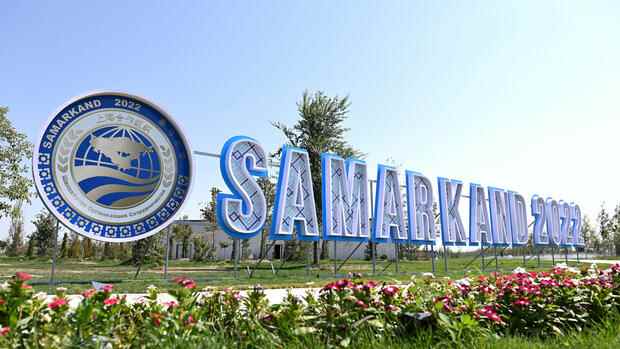Riga The institution has existed for over 20 years, its member states are among the largest countries in the world, they unite almost 40 percent of the world’s population – and yet very few people know the Shanghai Cooperation Organization, SCO for short. In the context of Russia’s war of aggression against Ukraine, however, the world’s attention is now focused on the organization’s meeting in the Central Asian member state of Uzbekistan.
The meeting point for the two-day gathering on Thursday and Friday is the historic city of Samarkand, a former trading stronghold on the Silk Road. 14 heads of state and government are on site, and the meeting between Russian President Vladimir Putin and China’s head of state and party, Xi Jinping, is awaited with great excitement. In addition, Putin wants to talk to Turkish President Recep Erdogan about the Istanbul Grain Agreement.
Iran’s accession and Belarus’ accession process are also on the agenda, and other summit participants are also interested in permanent membership: Erdogan, like the United Arab Emirates, has expressed interest in accession, Egypt, Qatar and Saudi Arabia strive for the status as a so-called dialogue partner.
The event also highlights the various conflicts in which members and observers of the organization are involved: in addition to Russia’s war against Ukraine, these include Azerbaijan’s attack on Armenia a few days ago and fighting on the border between Kyrgyzstan and Tajikistan, where gunfire exchanged between border guards from both countries on Wednesday. Over 30 percent of the 1,000-kilometer border between the two states is disputed.
Top jobs of the day
Find the best jobs now and
be notified by email.
>> Read here: Dozens dead after Azerbaijani attacks in Armenia
The organization, which now has eight member states, was originally founded to settle border disputes. In addition to Russia and China, members include India, Kazakhstan, Kyrgyzstan, Pakistan, Uzbekistan and Tajikistan. Iran is a so-called accession member, the observer states currently include Afghanistan and Belarus. States such as Turkey, Armenia or Azerbaijan are dialogue partners.
“Alternative to Western Institutions”
The SCO emerged as an international organization from the so-called “Shanghai Five”, a security agreement founded in 1996 between China, Russia, Kazakhstan, Kyrgyzstan and Tajikistan. When members met with Uzbekistan in 2001, the organization was born. Since then, the association has primarily dealt with regional security, the fight against regional terrorist groups, separatism and religious extremism, but also political and economic cooperation.
In the meantime, however, regional development policy has also become one of the core concerns. The institution is headquartered in the Chinese capital of Beijing, and the official languages are Russian and Chinese. The Council of Heads of State, the SCO’s top decision-making body, meets once a year. But the meeting has never attracted as much attention as this year.
On Wednesday, Uzbek President Shavkat Mirzijoyev and his Iranian counterpart met in Samarkand, Uzbekistan.
(Photo: via REUTERS)
Sebastian Hoppe, who researches the relationship between Russia and China at the Stiftung Wissenschaft und Politik (SWP) and at the Institute for East European Studies at Freie Universität Berlin, follows the meetings regularly. The organization does not usually produce politically binding decisions to the same extent as other international organizations, he explains: “In practice, the SCO is more of a kind of platform than an international organization and serves as an alternative to Western institutions.” The purpose of the matter? According to Hoppe, it is about “embodying a non-Western type of governance” and “staging” it at the meetings.
>> Read here: Russia and Kazakhstan: How the relationship between the two states is changing
Hoppe expects that it will be particularly interesting to see how the other heads of state treat Russia this year. “Of course, Russia has always been a big player in the SCO.” “But those states that also maintain economic relations with the West should now avoid Russia,” said Hoppe.
In the run-up to the meeting, observers point out the weaknesses of the alliance. As Temur Umarov, a fellow at the Carnegie think tank, commented, “To what extent the SCO will be able to serve the conflicting goals of its members is an open question.” He sees the SCO as “an organization that is still looking looking for her way”. In fact, the tense relationship between the member states India and Pakistan, for example, shows how limited the state club’s ability to act is.
More: First trip abroad since the outbreak of the corona pandemic: China’s head of state Xi is to meet Putin
